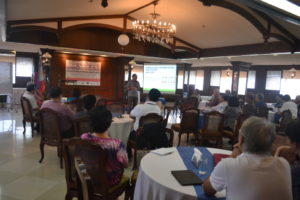This article was first published in Universitas in the first quarter of 1997.
“It is not wrong to want to live better…,” wrote John Paul II in his encyclical Centesimus Annus in 1991. “What is wrong is a style of life which is presumed to be better when it is directed towards ‘having’ rather than ‘being’, and which wants to have more, not in order to be more but in order to spend life in enjoyment itself. It is therefore necessary to create lifestyles in which the quest for truth, beauty, goodness, and communion with others for the sake of common growth are the factors which determine consumer choices, savings, and investments.”
It was towards creating such lifestyles that the Co-operatives Management Program (CMP) of the University of Asia and the Pacific (UA&P) was conceived. The program, established by the School of Management (SMN), aims to enhance the leadership of persons who promote and develop co-operatives by strengthening their managerial capabilities. As the objective of co-operatives, especially where poor people are involved, is to generate opportunities for self-employment through small enterprises among their members, the CMP ultimately aims to help alleviate poverty indirectly by creating income-generating opportunities for the unemployed through these small and medium enterprises organized as cooperatives.

The program, which opened July 17, 1997, is directed to managers, directors, leaders, and executives who promote or manage cooperatives, and to non-government organizations (NGOs), local government units (LGUs), the academe, and private business organizations with co-operative programs or projects. Mr. Bienvenido Nito, program director, says, “We want to be a partner of the co-operative movement. We want to contribute to the development of courses for the leaders of the co-operative movement. And we want to develop a pool of resource persons and networking among them for the movement itself and sustain this movement to be an effective vehicle for economic development, equity, and social justice as mandated in our constitution.”
Mr. Nito, who is also a chairman of the board of a primary credit co-operative with about 5,000 members (many of whom are vendors who were victims of loan sharks), conceptualized and proposed the Co-operatives Management Program. The program was steeped in a deep desire to help the poor, seeing the complementary and supplementary role of co-operatives in community and family enterprise. He said, “If we strengthen these co-operatives by enhancing the management and leadership capabilities of those who run them, we will transform the lives of many people; for instance, we will be able to assist them in sending their children to school, in acquiring homes, and in availing of health services.”

The Advanced Co-operative Management Course (ACMC) is designed for busy leaders and managers, offered as a complete course for 10 months, leading to a certificate in Cooperatives Management. Meetings are held monthly every third Thursday, Friday, and Saturday.
Since 1990, the UA&P has offered seminars and workshops on co-operatives management. To date, it has gained participation from 130 top cooperatives and private corporations from all over the country. Participants include top corporations like Kraft General Foods Philippines, San Miguel Packaging Products, Nestle Philippines, Inc., Red Ribbon, Inc., and Vitarich Corporation.
“These corporations look at co-operatives as partners in the delivery of support services and distribution of products. T’boli Agro-Industrial Corporation, for instance, needs co-operatives to help in growing pineapples and supply of inputs,” observes Mr. Nito. He cites Dr. Bernardo M. Villegas, dean of the UA&P School of Economics who hopes by the year 2020 to see the mushrooming of these co-operatives enterprises to allow micro-enterprise to participate in the socio-economic mainstream of society, avoiding that they are marginalized in the globalizing economy.
The Advanced Co-operatives Management Course’s strength is in its strategic management orientation, values focus, and economics framework. Program modules include the following:
Issues and development related to co-operatives
Business economics
Strategic planning and management
Marketing strategy
Organization culture and values
Managing human resources
Organizational leadership and communication
Production and operations management
Financial analysis and fund management
Project development and management
Leave a Reply